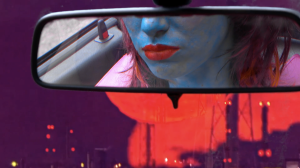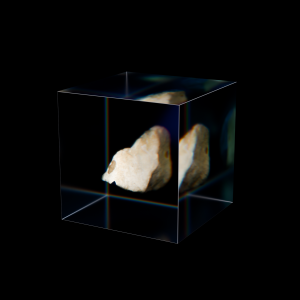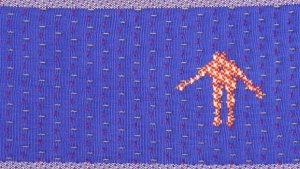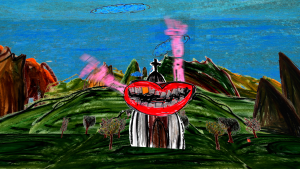Upcoming: SCREENING: FAKENESS
This fall, the facade of Das Leben am Haverkamp transforms again into an outdoor cinema. Every two weeks, a new experimental triptych will light up the windows! Screening daily from 17:00—23:00h.
In this edition we explore Fakeness: digital twins, artificial demand, myths, as-if. What can we learn from the imitation, the fictional or the machine-authentic rip-off? Are we threatened by them, or can they be seen as a relief in a world that seems to be obsessed with realness and authenticity? What does the fake tell us about the real? Who decides what is classified as authentic? Collectively we aim to research the ambiguity of realness and fakeness.
Thanks to our amazing external committee, consisting of Caz Egelie (visual artist), Rosa Meulenbeld (visual artist and digital fashion fanatic) and Sami & Ike (neighbourhood representatives), four works have been selected to be shown. Scroll down to see the programme.
The programme is part of OBSESSED jewellery festival and Hoogtij. On the 28th of November, 20:00—20:45 h, you are invited for a Q&A with the makers. In a decor designed by Boris Deben we host a conversation around fakeness. What does it mean for each of them, and how do they instrumentalise it in their work? On this special evening we screen all films, and serve some hot drinks outside!
3—16 November
17:00—23:00 h
MARTYNA PEKALA (PL)
Lips Made of Petals (2025, 9 min)
Lips Made of Petals is an experimental short film in which a fictional video game character navigates the realities of being a migrant in the ‘physical world’. The film portrays the quest of touching grass, in order to get back online. In the film, Martyna Pekala refers to social media apps that require their users to send a photo of them touching real-life grass in order to unblock their account. A literal gesture of connecting back to reality. The film culminates in a tulip field, the picturesque cover image of the Netherlands. However, Martyna uses it as a symbol of migration, since the flower originally wasn’t native to the country’s flora. Through referencing such a strong cultural symbol at its most manicured inauthentic glory, she reflects on her own status of being a migrant in the Netherlands.

17—30 November
17:00—23:00 h
YUBIN JIA (CN)
How to Store a Stone (2025, 2 min)
How to Store a Stone is a series of short 3D animations exploring the absurdity of over-design — the tendency to create elaborate, unnecessary solutions for objects or needs that require none. In each animation, Yubin Jia imagines a different fictional method of ‘storing’ a stone — freezing, vacuum sealing, enclosing in glass, locking in a safe — each more excessive than the last. Through a minimal visual setup and precise rendering, the work humorously critiques consumerism, artificial demand, and the aesthetics of useless innovation. By pushing a simple object into a cycle of unnecessary transformations, the work exposes the theatrical nature of innovation. When does design move beyond function and drift into fiction?

1—14 December
17:00—23:00 h
NOA MAC DONALD (NL)
Textile Translations, a Labour of Love (2025, 2 min)
Noa Mac Donald presents Textile Translations, a Labour of Love. The film is a frame-by-frame animation, using knitted surfaces. Moving between animation, printmaking and fiber art, she’s fascinated how textures, stitches and pixels can blur the boundaries of authenticity. Using a knitting machine to produce the frames, the work questions the fine line between handmade and mass production, being ‘fake-handmade’ and ‘machine-authentic’ at the same time. What is real? What is simulated? The big amount of tangible frames that were needed to produce the animation emphasizes the care, time, and craft involved, while questioning how we value those concepts.

15—28 December
17:00—23:00 h
BORIS DEBEN (BE)
Forbidden Fruits Taste Better (2025, 8 min)
The film Forbidden Fruits Taste Better can be seen as a queer altar to the impossible. Boris Deben uses automatic drawing as a starting point. He reappropriates religious storytelling, with a confrontational yet playful energy. The work aims to transform an exclusionary biblical myth into an inclusive space, by re-imagining the birth of the universe. Drawing from cartoons and found imagery, Boris liberates signs and symbols from their common understanding and develops a vibrant, spontaneous visual language.

The programme is supported by Creative Fund NL, Gemeente Den Haag and VSB Fonds